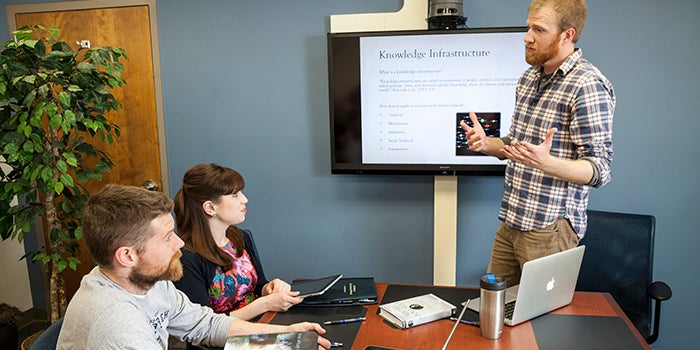
The beginnings of the School of Computing and Information trace back to 1901, at the Carnegie Library of Pittsburgh Training School for Librarians — the first program in the country to educate librarians to work with children and young people. One hundred years later in 2001, the Master of Library and Information Science (MLIS) degree became the first online degree program offered at the University of Pittsburgh. By completing an innovative degree program that lies at the nexus of human-centered and ethical issues in computing and information, MLIS graduates find success in their careers.
“When you look at our MLIS students, you’ll find that they’re people-oriented,” says Dr. Mary K. Biagini, chair of the Department of Information Culture and Data Stewardship (ICDS). “We’re very much focused on the common good.”
The MLIS curriculum reflects the competencies necessary to work across the information professions. That’s why the MLIS curriculum aligns with the core values of associations of the information professions, including the American Library Association, which accredits Pitt’s MLIS program. This accreditation allows MLIS alumni to secure positions in knowledge organizations across the United States and abroad.
ICDS faculty redesigned the MLIS program in 2018 to reflect changes in the information professions and to incorporate input from alumni and their employers. MLIS students now graduate better prepared for their careers, with a knowledge of design methods and information systems as well as an understanding of Python programming language and of the roles of information professionals in their communities.
The faculty complement these skill sets by incorporating experiential learning and project-based teamwork into coursework. Through the Design Methods Sequence, students spend two consecutive terms working with a partner knowledge organization, such as the University Library System, to solve information problems. MLIS students may choose to participate in other experiential learning opportunities including Field Experience, the School Library Practicum, and the Partners Program, during which alumni and other information professionals in knowledge organizations across the country mentor them.
“Our MLIS program is designed for students to build a knowledge base, a skill set, and a set of professional dispositions that will prepare them for their careers,” Biagini says. “We have a lot of confidence in our students when we send them into the field.”
The information professions offer a multitude of career possibilities as well as a range of opportunities to contribute to the betterment of individuals and communities. The MLIS program in the School of Computing and Information offers students intellectually and emotionally satisfying career possibilities.
